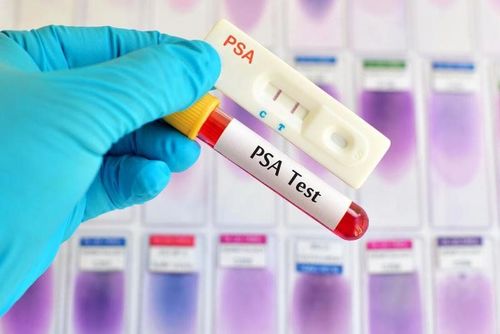This is an automatically translated article.
Uterine cancer is one of the serious health problems in women that not only affects fertility but can also be life-threatening. The following article will help you learn in detail about uterine cancer as well as prevention/treatment.
1. What is uterine cancer?
Uterine cancer is defined when there is a malignant tumor formation inside the uterus - an organ of the female reproductive system, similar in shape to a pear. The vast majority of uterine cancer tumors are found in the lining of the uterus (or endometrium). In addition, tumors can also develop in the muscles of the uterus.
Currently, according to statistics, more than 60,000 women in the United States are diagnosed with uterine cancer every year.
2. Who is at high risk for uterine cancer?
The incidence will be higher when you have reached menopause.
In addition, genetic factors may also play an important role in determining the incidence of uterine cancer. For example, Lynch syndrome - a genetic disorder - can increase your chances of getting some cancers, including uterine cancer.

Phụ nữ độ tuổi mãn kinh có tỉ lệ mắc ung thư tử cung cao hơn bình thường
3. What are the signs of uterine cancer?
For women who have not yet reached menopause, a sign of uterine cancer you need to watch out for is vaginal bleeding or vaginal discharge that is red, pink or white, between periods. This phenomenon can also occur in postmenopausal women.
In addition to uterine cancer, abnormal vaginal bleeding can also be a dangerous symptom of many other diseases in women, especially vaginal bleeding after menopause.
In the above case, you need to see a doctor as soon as possible to have the appropriate tests and tests to determine the cause.
In addition, uterine cancer can also cause some other signs such as:
Pain in the pelvic area, the main area between the hips of the body. Unusual weight loss without a specific cause. Pain during sex. Frequent urination, pain when urinating, or difficulty urinating...
4. How is uterine cancer diagnosed?
To accurately determine whether the patient is suffering from uterine cancer, doctors will conduct an ultrasound of the inside of the uterus to get an image of the tumor. Besides, a thin and light tube will also be inserted into the vagina to better visualize the tumor.
Above all, a cell biopsy is the best test to know if your tumor is cancerous. In this method, the doctor will remove a small amount of tissue from the area of endometrial cells, then look for cancer cells under a microscope.
Besides, uterine cancer, when detected, has the ability to spread to nearby areas such as the cervix or lymph nodes (small gland areas in the groin, armpits, neck and other parts of the body). ). Therefore, some other tests also need to be done to see how far the tumor has spread such as:
Ultrasound. Magnetic resonance imaging (MRI) uses a magnetic field and radio waves to create detailed images of parts of the body. CT scans and X-rays are taken from many different angles, stitching all the results together to create a complete image.
5. How is uterine cancer treated?
Hysterectomy
Currently, the best method for treating uterine cancer is surgically removing your uterus. In addition, other organs such as the ovaries and fallopian tubes will also be removed during this surgery.
In case the cancer cells have spread widely, the doctor will also remove lymph nodes in the nearby area.
Radiation therapy for uterine cancer
If your health conditions are not suitable, doctors will recommend using radiation therapy to destroy the cancer cells that are still present. This method uses high-energy rays to affect and destroy harmful cells.
Hormone therapy stops uterine cancer progression
Certain hormones, such as estrogen, can stimulate the growth and spread of tumors in the uterus. Therefore, doctors will suggest patients to use some drugs such as tamoxifen, progestin, LHRH, aromatase inhibitors... to block the body's production of tumor-stimulating hormone, thereby slowing down the growth. tumor growth.
The use of the above medicines can cause side effects similar to menopause, including weight gain, hot flashes, vaginal dryness...
Immunotherapy
This is the way to go certain drugs to boost the immune system to find uterine cancer cells and destroy them. To keep the immune system from destroying the body's healthy cells, it uses "checkpoints". In addition, certain immune checkpoint inhibitors will be used for severe endometrial cancers.
Targeted therapy
This therapy uses new drugs that target cancer cells. Some types work by preventing new blood vessels from forming in malignancies of the uterus, slowing the spread of uterine cancer.

Xạ trị là một trong các phương pháp điều trị ung thư tử cung hiện nay
6. How does uterine cancer treatment affect daily life?
Sex life
Treatment for uterine cancer can change your daily sex life because it causes vaginal dryness, decreased libido... You can use certain substances. Natural lubrication to improve this problem.
Childbirth and pregnancy
Some young women of reproductive age are still at risk of uterine cancer, and this disease seriously affects a woman's reproductive function. Therefore, if you are planning to have a baby, before treating the disease, you need to tell your doctor clearly to have appropriate preventive methods, including egg storage. It can be said that uterine cancer is a common dangerous disease in women, causing not only daily life but also negative health effects and even life-threatening consequences. Therefore, you need to have regular check-ups to detect the disease early, increasing the likelihood of successful treatment of uterine cancer.
Vinmec International General Hospital is one of the hospitals that not only ensures professional quality with a team of leading medical doctors, modern equipment and technology, but also stands out for its examination and consultation services. comprehensive and professional medical consultation and treatment; civilized, polite, safe and sterile medical examination and treatment space.
Please dial HOTLINE for more information or register for an appointment HERE. Download MyVinmec app to make appointments faster and to manage your bookings easily.
Reference source: webmd.com












